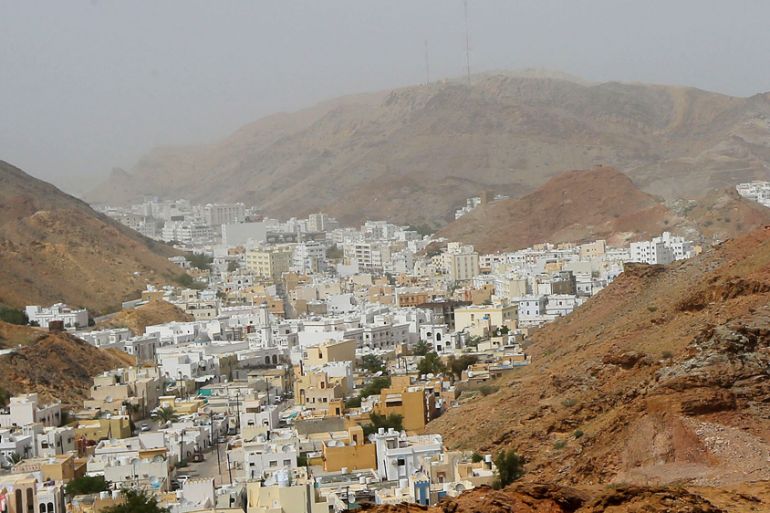Oman launches amnesty for undocumented workers
Tens of thousands of labourers are expected to take advantage of the chance to return home without legal consequences.

Muscat, Oman – Mohammed Babar, a Pakistani worker who overstayed his visa in Oman for the past three years, has submitted his papers to return back home empty-handed.
Like many other migrant workers, he boarded a flight to Oman looking for a better life. But fate was against him, he said.
Keep reading
list of 4 itemsAre settler politics running unchecked in Israel?
Post-1948 order ‘at risk of decimation’ amid war in Gaza, Ukraine: Amnesty
UK passes bill to deport asylum seekers to Rwanda: What’s next?
“I didn’t earn anything. I had to undergo suffering only. When my sponsor passed away, then his sons didn’t want to renew my visa. Since then I became undocumented,” Babar told Al Jazeera. “The financial liabilities here in Muscat and back home made me an overstaying migrant worker.”
Babar has not returned to Pakistan since landing in Oman in 2012. “I had told my children that I would return in one year. But now three years have passed,” he said.
Now, he has decided to return home under an amnesty programme announced by the Omani government. The amnesty, which began on May 3 and will run until the end of July, allows undocumented and overstaying workers to fly back home without facing any legal action for violating their residency status and Oman’s labour laws.
RELATED: Oman’s Arab Spring legacy: Good governance?
Oman carried out similar amnesty programmes in 2005 and 2010. In the 2010 amnesty, around 60,000 undocumented migrant workers, mainly from India, Bangladesh, and Pakistan, left the country, according to embassy officials.
“Amnesties are announced periodically to regulate the labour market,” Talib al-Dhabari, an official with Oman’s Ministry of Manpower, told Al Jazeera. “Undocumented and overstaying migrant workers often offer their services at a lower price when compared to the documented workers. This creates many problems in the labour market.”
I had to spend a lot of money to get a visa. I sold my land for the visa money. How could I go back without earning?
A spokesperson for the Royal Oman Police, which was part of a joint team that has conducted raids on the shelters of undocumented migrants, said many entered the sultanate illegally. “Many infiltrators get caught while trying to enter the country. However, there are a number who make it,” he said. “[Some] undocumented workers are easily convinced by criminals to do anything in order to earn money.”
Ahmed al-Hooti, a member of the Oman Chamber of Commerce and Industry, said the amnesty presented a good opportunity for undocumented workers.
“It is the time for them to maybe start a new life,” Hooti told Al Jazeera. “Many expat workers pay lots of money expecting to come here and find a proper job, but they end up with only promises.”
Officials from India, Bangladesh, and Pakistan said they expected a total of around 55,000 undocumented migrant workers to make use of this year’s amnesty.
Shaji Sebastin, a Muscat-based Indian social worker, said workers overstaying their visas could avail themselves of the amnesty at the Ministry of Manpower’s labour offices in Muscat after registering with their embassy. Sebastin has also been coordinating with embassy officials to find undocumented workers and help them to take advantage of the amnesty.
“By continuing as an undocumented worker, a migrant is risking everything,” Bheem Reddy, an Indian trade union leader and migrant workers’ rights activist, told Al Jazeera. “In the Gulf countries… I know several cases where migrant workers were harassed mentally and physically by their sponsors. In a majority of the cases, we can see that a migrant worker is also denied basic human rights.”
RELATED: Oman sets sights on tourism industry
Rafeek Ravuther, a migrant rights activist in India, said both the host and foreign countries must discuss the larger issue of how documented migrant workers become undocumented, and why they are compelled to overstay in foreign countries.
“No one wishes to overstay in a foreign land alone and struggle for his existence. If a migrant worker’s rights are protected and if he is treated as a human being, he would become more productive and this issue can be resolved forever,” Ravuther told Al Jazeera.
Sadasivan Sateeshan, an Indian undocumented migrant worker in Oman, told Al Jazeera that life is difficult and traumatic for many migrant labourers.
“The fear of being caught by the police, joblessness, lack of proper shelter and even a morsel of food are a daily dilemma,” said Sateeshan, who has overstayed his visa in Oman for the past year.
After leaving his sponsor following a workplace dispute, and amid burgeoning liabilities at home, he was left with no alternative but to overstay, Sateeshan said. “I had to spend a lot of money to get a visa,” he said. “I sold my land for the visa money. How could I go back without earning?”